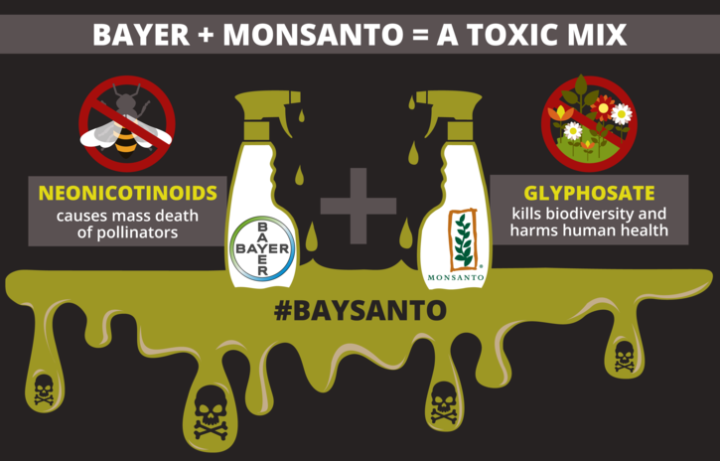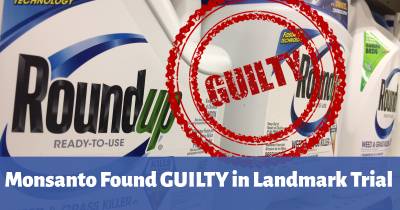You are using an out of date browser. It may not display this or other websites correctly.
You should upgrade or use an alternative browser.
You should upgrade or use an alternative browser.
Monsanto And The US Government
- Thread starter JUPITERASC
- Start date
Opal
Premium Member
Roundup and Agent Orange are very closely related. If I remember correctly.....Agent Orange is T24 and Roundup is T24A......in a course I took, the purposed that Roundup is in actuality safer than Agent Orange.....but, seriously......I took the course on pesticides, herbicides and fungicides.....after completing it, all I could think was.....who the heck could take this course and then work in this field.......it really drives it home how dangerous they are.........
JUPITERASC
Well-known member
Roundup and Agent Orange are very closely related.
If I remember correctly.....Agent Orange is T24 and Roundup is T24A
......in a course I took, the purposed that Roundup is in actualit
y safer than Agent Orange.....but, seriously......I took the course on pesticides, herbicides and fungicides
.....after completing it, all I could think was
.....who the heck could take this course and then work in this field
.......it really drives it home how dangerous they are.........

JUPITERASC
Well-known member
JUPITERASC
Well-known member
Roundup and Agent Orange are very closely related.
If I remember correctly.....Agent Orange is T24 and Roundup is T24A
......in a course I took, the purposed that Roundup is in actualit
y safer than Agent Orange.....but, seriously......I took the course on pesticides, herbicides and fungicides
.....after completing it, all I could think was
.....who the heck could take this course and then work in this field
.......it really drives it home how dangerous they are.........

JUPITERASC
Well-known member
JUPITERASC
Well-known member
Honey bee colonies have experienced widespread die-offs
in a phenomenon known as Colony Collapse Disorder.
A class of pesticides known as neonicotinoids
are weakening the bees, if not killing them outright.
Mega-corporations are making a killing off their pesticides
—but are they also getting away with murder?
Minnesota beekeeper Steve Ellis likens
the bees that are exposed to neonics to cancer patients.
Even if they don’t die from the chemical, their immune systems are weakened enough
to make them susceptible to other ailments.
“When bees come in contact with a lot of these chemicals, it makes them sick a
nd it also makes them mad.
It’s part of the disorientation.
They’re jumpy.
They sting more, which also kills them.
It’s no fun to work bad bees.
It’s just about the most depressing thing a beekeeper can do.”
We know that pesticides such as neonicotinoids and glyphosate harm the bees
and other pollinators, causing mass die-offs.
The EPA should be banning these chemicals.
But what does the EPA do instead?
Most recently, EPA put bee-killing pesticide, sulfoxaflor, back on the market
and expanded its use.
The Trump administration has promised to deregulate at all costs
so that corporations can profit
at the expense of America's health and the environment.
READ: https://earthjustice.org/features/the-perfect-crime

in a phenomenon known as Colony Collapse Disorder.
A class of pesticides known as neonicotinoids
are weakening the bees, if not killing them outright.
Mega-corporations are making a killing off their pesticides
—but are they also getting away with murder?

Minnesota beekeeper Steve Ellis likens
the bees that are exposed to neonics to cancer patients.
Even if they don’t die from the chemical, their immune systems are weakened enough
to make them susceptible to other ailments.
“When bees come in contact with a lot of these chemicals, it makes them sick a
nd it also makes them mad.
It’s part of the disorientation.
They’re jumpy.
They sting more, which also kills them.
It’s no fun to work bad bees.
It’s just about the most depressing thing a beekeeper can do.”
We know that pesticides such as neonicotinoids and glyphosate harm the bees
and other pollinators, causing mass die-offs.
The EPA should be banning these chemicals.
But what does the EPA do instead?
Most recently, EPA put bee-killing pesticide, sulfoxaflor, back on the market
and expanded its use.
The Trump administration has promised to deregulate at all costs
so that corporations can profit
at the expense of America's health and the environment.
READ: https://earthjustice.org/features/the-perfect-crime

JUPITERASC
Well-known member
JUPITERASC
Well-known member
https://www.youtube.com/watch?v=khfdjPbecwM Great video and channel






